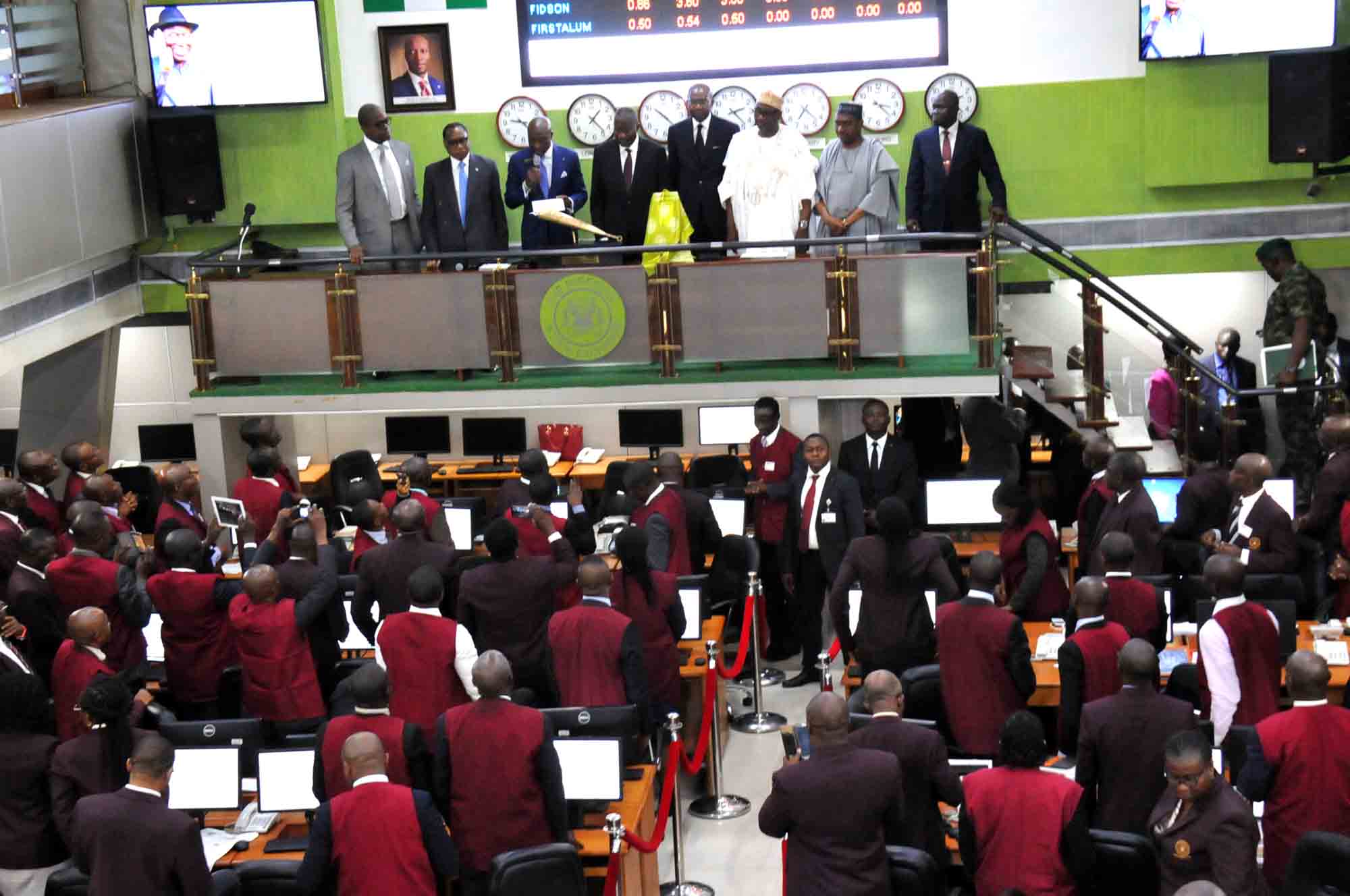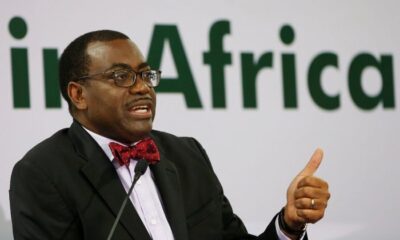Markets
Renewed Investor Confidence as Stock Market Hits N13 Trillion
Published
7 years agoon

- Renewed Investor Confidence as Stock Market Hits N13 Trillion
The stock market rally that lifted the equities capitalisation to N13 trillion signals gains for investors and may have restored the requisite investor confidence, writes Goddy Egene.
At the beginning of this year, many stock market operators expressed optimism that the market would witness positive performance. Their optimism is not misplaced, as events have shown. Firstly, the market had recorded three consecutive years of decline, falling in 2014, 2015 and 2016. It was, therefore, a bit certain that the bulls would return in 2017. Secondly, operators were upbeat because of efforts being made by the federal government to ensure that the economy was out of recession, a development that was expected to impact positively on the market.
Positive Prospects
Consequently, market stakeholders had envisaged that a recovery was possible this year. However, the high rate of recovery, which the market has attained so far, was unexpected. By the close of trade on Tuesday, August 8, the market had hit a three-year high, with the Nigerian Stock Exchange market capitalisation standing at N13.1 trillion for the first time since October 2014, while the NSE All-Share Index closed at 37,999.56.
An analysis of the market performance showed that it rose by 23.2 per cent in the first half of the year and has improved on that growth, rising by another 18.7 per cent within the first few days of the second half (H2) of the year.
The market had started the year on a bearish note with a decline of 3.1 per cent in January, 2.7 per cent in February. It recorded a marginal gain of 0.7 per cent in March and 0.9 per cent in April before surging by 14.5 per cent in May.
Chief Executive Officer of the NSE, Mr. Oscar Onyema, some operators and market analysts had expressed optimism that investors should expect a positive performance this year. According to him, the capital market is a subsector of the Nigerian economy and since it had been projected that the economy would recover from its recession and record a growth this year, the stock market should also recover.
Investors’ Confidence
The road to the rally that has been sustained till now was actually opened with the introduction of the new foreign exchange window for investors and exporters by the Central Bank of Nigeria towards the end of April. That policy reinforced the demand by foreign investors, who were later followed by domestic investors. The better-than-expected results for half year to June 30 by some companies also bolstered investors’ positive sentiments.
Assessing the prospects of the market, analysts at FSDH Research expected the bull run to be sustained in June. They said, “We expect to see a continued uptick in investors’ appetite for equity investment in June 2017. The following factors may drive performance: the stability in the macroeconomic environment; the return of foreign investors into the equity market as a result of the increased supply of foreign exchange, especially through the I&E forex window; improved confidence on the outlook of the Nigerian economy; rebalancing of portfolio occasioned by the increase in the weights of some of the NSE quoted companies on the Morgan Stanley Composite Index.”
According to the FSDH Research analysts, the performance of the equity market in the last five years shows that the market recorded negative performances between May and June, except in 2014 and 2016.
“However, we expect the equity market to appreciate in the month of June 2017, as the economic outlook becomes increasingly positive,” they said.
The Ayodeji Ebo Afrinvest West, an investment banking group, had said despite the performance witnessed between the last week of April and end of May, Nigerian stocks were still trading cheap. According to him, a review of banks’ price to book (P/BV) and earnings multiples reveal that banks’ earnings remained upbeat in the past three years, notwithstanding the decline in share prices.
Ebo said, “In the past, foreign investors looked beyond cheap valuation and focused on FX illiquidity and economic challenges as it damped investor confidence. For instance, in 2014, GTBank traded around 2.6x and 9.4x P/BV and P/E, respectively. Average P/BV and P/E for Tier-1 Banks at the time were 1.3x and 8.0x, respectively. However, in 2016, GTBank’s P/BV and P/E dipped to 1.3x and 5.4x apiece on the above aforementioned factors.
“Now, with the improvement in FX supply as well as the creation of the I &E window, I have observed improved mandates from FPIs. The market determined rates at the I &E window has translated into the FPIs receiving more naira value for every dollar inflow, giving them the ability to acquire more financial assets. As highlighted by the CBN, activity level at the window has been impressive, as over $1.0 billion in transactions have been carried out, with the CBN supplying only about 30 per cent of FX at the window. The impact of the success recorded at the window has been evident in the performance of the NSE, as a number of stocks have rallied on the back of bullish sentiments and I believe there is further room for upside in some stocks.”
Investors have reaped significantly from the rally as indicated by the sectoral that have pointed northward. For instance, NSE Banking Index gained 65.9 per cent, while the NSE Industrial Goods Index has chalked up 41.6 per cent. The NSE Consumer Goods Index gained 25.2 per cent, just as the NSE Insurance Index appreciated by 13.4 per cent.
Looking at the sustainability of the bull run, analysts at Cordros Capital Limited, an investment banking firm, have said the equities market would remain bullish for the most part of the second half (H2) of 2017.
“The gains will be supported by consistency and sustainability of policies that speak to near term macroeconomic recovery, in addition to better-than-2016 corporate earnings,” they said.
They acknowledge downside risks from around the globe, notably rising geopolitical tensions, higher interest rates in the United States, and most profoundly, hazy outlook for oil prices – which could particularly threaten forex stability and consequently spark capital flow reversal.
Cordros Capital, however, stated that developments in the domestic economy signal recovery in the near term, which will further strengthen investor appetite. They added, “We look for the economy exiting recession in Q2-2017 (we project output to expand by 1.80 per cent during the quarter and 0.97 per cent for the full year). As a leading indication, manufacturing and non-manufacturing activities expanded in the second quarter of the year, as revealed by the Purchasing Managers’ Index (PMI), which averaged 52.2 and 52.1 points, respectively, during the three months period. We expect that to be consolidated by fiscal spending related gains from the 2017 budget.”
The analysts noted that further supporting the argument for a bullish run on the domestic bourse, the CBN’s Nigerian Autonomous Foreign Exchange Rate Fixing (NAFEX) window had the potential to further buoy foreign portfolio investment inflows over H2. Still on expected increased participation in the equities space, according to them, the likely implementation of the amended Regulation on Investment of Pension Fund Assets, particularly the introduction of the multi-fund structure released by the National Pension Commission (PENCOM) on April 18, will further bolster local pension funds’ exposure to equities.
They added, “The impact of this on pension fund managers exposure to risky asset will be positive for dealers who are already taking advantage of cheap valuation in local proprietary positions. Compared to 2016, most listed companies appear better positioned to deliver better-than-anticipated results over the remaining part of the year.
Drilling on activities in the consumer goods space, we hinge our optimism on notable upside factors, including improved access to the dollar (potentially limiting finance cost), moderately recovering consumer confidence, easing energy challenges, balance sheet deleveraging, rebounding aggregate demand (amid expected fiscal stimulus), and cost-reflective pricing.”
Is the CEO and Founder of Investors King Limited. He is a seasoned foreign exchange research analyst and a published author on Yahoo Finance, Business Insider, Nasdaq, Entrepreneur.com, Investorplace, and other prominent platforms. With over two decades of experience in global financial markets, Olukoya is well-recognized in the industry.

You may like
-
Nigeria Joins BRICS as Partner Country, Strengthening Global South Cooperation
-
70 Million Poorest of The Poor Nigerians To Get N75,000 From FG
-
Nigeria Surpasses OPEC Quota with 1.51 Million bpd, Targets 2.06 Million in 2025
-
Global Investors Commit $7.6 Billion to Nigeria’s Development at AIF 2024
-
Nigeria-China Trade Strengthened as Grimaldi Introduces Direct Shipping Line
-
Nigeria’s GDP Records 3.46% Growth in Q3 Spurred by Non-Oil Sector













